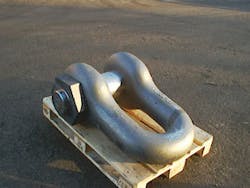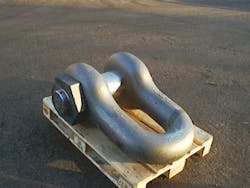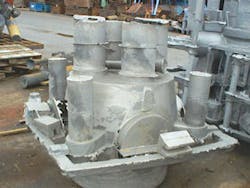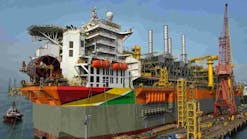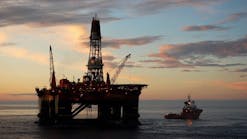Cast steel specialist Kohlswa Gjuteri is delivering 85 joining and anchor shackles, each unit weighing around 1 ton, to Statoil’s Volve development in the North Sea.
The shackles have been ordered by Ramnäs, and will form part of its anchor chain delivery to APL. The latter is supplying the submerged turret loading (STL) system through which oil will be transported from the Volve jackup production platform to a floating storage unit.
The joining shackles incorporate Ramnäs’ new RAM-plate design, which allows chain and wire to be connected without the need for a triplate. Kohlswa is also manufacturing 12 special anchor shackles as part of Ramnäs’ anchor chain delivery to ConocoPhillips’ CoroCoro project in Venezuela. The first recently underwent break tests for classification society ABS, prior to delivery.
Cast vs forged/welded
Kohlswa supplies castings from 20 to 8,000 kg, and shackles and connecting plates in a range from 300kg to 1,300kg, with diameters of 100-200mm. The shackles, which are required to have good tensile strength and impact resistance, are made from offshore grades of hardened cast steel.
The foundry specializes in short series production, in which forged products have difficulty in competing. Cast products have several advantages over forged products, Johansson says. One of the most important is isotropism - possessing the property of having equal strength in all directions. Casting also allows freedom of design/construction - the ability to incorporate a large degree of irregularity in the shape of products. Spherical inclusions can be incorporated, which is difficult in a forging. Pattern costs are also much lower, whereas forging by contrast requires expensive tools.
A hub body, part of a delivery to Rolls-Royce, following casting and cooling.
Casting provides additional advantages over welded products, including isotropism and freedom of design. Cast products have better break strength, fatigue strength and are more resistant to stress corrosion.
Kohlswa’s delivery of pipeline support porches to ABB Offshore Systems for Ireland’s Corrib project in 2001 is a good example of casting proving superior to welding. In this case, the porches were originally manufactured using welded steel plate, but developed cracks due to the presence of higher forces than had been expected.
The design process for casting the structures was therefore verified via extensive 3D simulation. Along the way, additional benefits of using cast steel became apparent, such as the ability to vary wall thicknesses in different parts of the porch in accordance with the expected stresses. The thicknesses varied from 26mm to 60mm. This allowed steel to be saved, contrasting with a welded structure, for which plate in a uniform thickness adequate for the most stressed part would have to be used. The cast porches weighed 1.1 tons each.
Kohlswa regularly delivers products to Norwegian suppliers of marine equipment. One is Karmøy Winch, to which it supplies the towpin installed on supply vessels for safety purposes; another is Triplex.
Another important customer in Norway is offshore vessel builder Rolls-Royce Marine, to which Kohlswa supplied over 30 propeller blades in 2005, each weighing around 600 kg.
The company’s foundry is also a regular supplier to mooring specialist Moorlink, which commissioned swivels for delivery to Petrobras in 2004. The swivels form part of the mooring systems for floating rigs or platforms. Made of different grades of hardened cast steel, they are supplied, with orcots, assembled ready for use, following machining and surface treatment.
Through intermediaries, Kohlswa has supplied products to offshore projects elsewhere, including ConocoPhillips’ Bayu Undan project in the Timor Sea (joining shackles and connecting plates), Petrobras in Brazil (swivels), CNOOC’s Wenchang development in the South China Sea (joining shackles and connecting plates), and in the Norwegian sector, Norsk Hydro’s Troll B platform (joining shackles) and Statoil’s Åsgard B and C floaters (joining shackles and connecting plates).
Other marine products commonly used in offshore vessels are thruster parts. Kohlswa has produced several consignments for Rolls-Royce Marine of Sweden. Typically weighing around three tonnes, they are made from ASTM A 216 WCA cast steel.
Other parts for ships include keels, propeller blades and components for water jet units. For parts in contact with sea water, advanced steel alloys such as martensitic and duplex stainless steels are normally specified.
Kohlswa, which was founded in 1548, is approved by all the main classification societies active in the offshore sector, including ABS, Bureau Veritas, DNV and Lloyd’s Register. It works to the ISO 9001:2000 quality assurance system.•
For further information contact Bernt Johansson, Kohlswa Gjuteri .Tel +46 221 830 05, fax +46 221 830 19. bernt. [email protected], www.kohlswagjuteri.se.
